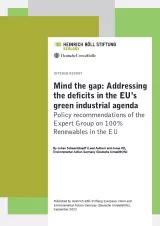Mind the gap: Addressing the deficits in the EU’s green industrial agenda
Read the final report "The 100% Renewable Energy Action Plan for the next European Commission".
The energy and climate policy debate has shifted fundamentally since Russia’s attack on Ukraine in February 2022. Following on the heels of the Fit-for-55-package, there is a rush to accelerate planning and permitting of projects of renewable energy, hydrogen, mining and other infrastructure. The EU is striving to rapidly become more independent regarding not only energy but also critical raw materials (CRM), and to reshore and attract green industries, reacting to new industrial strategies being adopted by other countries, like the US-American Inflation Reduction Act (IRA) and rising concerns about China’s dominance in global clean tech value chains. These have resulted in a range of new initiatives, such as REPowerEU, the Green Deal Industrial Plan (GDIP) and a flurry of new energy partnerships, chiefly focused on securing hydrogen imports.
Heinrich-Böll-Stiftung European Union and Environmental Action Germany (Deutsche Umwelthilfe) have convened a group of over 20 experts from academia, industry, civil society and policy makers to discuss these issues, referred to as the Expert Group. During our discussions, we identified several important policy gaps in the EU’s approach, which should be addressed to ensure that the EU’s new climate and industry agenda becomes as effective and globally equitable as it can be.
Product details
Table of contents
Introduction 3
EU energy and resource usage should remain within planetary boundaries 3
Moving towards a 100% renewable energy system 7
Attracting clean tech investment: EU requires a clear, predictable framework 9
The energy transformation must benefit all of the EU 12
Guaranteeing global socio-ecological standards and practicing global equity 14
A more realistic approach to the new hydrogen economy 16
